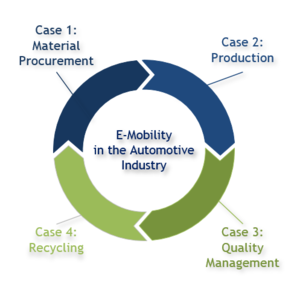Contents
Due to technological change and the increasing importance of data analytics and AI, the requirements profile of companies for graduates as specialists and managers is becoming increasingly interdisciplinary.
S3G focuses on interdisciplinary educational goals between business administration, sustainability, AI and data science. It is an application-oriented and interactive business simulation that offers project-based learning to promote self-directed and active learning within interdisciplinary cross-university teams. Therefore, it is about teamwork, gamification and competition elements.
The course contains the following aspects:
- Work in a cross-university team in competition with other team.
- Working on case studies along selected steps of a circular economy.
- Independent technical implementation of machine learning applications to address business challenge.
- Consideration and analysis of technical, economic, environmental, and social implication.
Learning Goals
- Knowing and understanding the use and evaluation of various machine learning approaches to solving business decision problems.
- Applying techno-economic skills.
- Identifying business decision-making situations and analyzing available data.
- Evaluating data using machine learning and making business decisions based on that data in a sustainability context.
- Implementing machine learning applications technically and evaluating (potential) economic, environmental, and social impacts.
- Practicing team and project management skills and presentation techniques.
Registration

Information session
There will be an information session for all students interested in this course, which will take place remotely. The information session will be held at the beginning of April, with the exact date and the link for the meeting to be confirmed in due course.
 Recommended qualifications
Recommended qualifications

